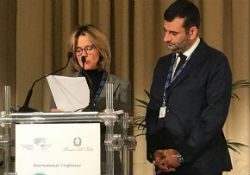Urban Health Rome Declaration adopted at Health in the Cities

WHO
Health in the cities is an investment opportunity rather than purely a cost driver. This is the key message of the Urban Health Rome Declaration, signed jointly by Beatrice Lorenzin, Minister of Health of Italy, and Antonio Decaro, President of the National Association of Italian Municipalities, and adopted during the international conference “Health in the Cities” on 11 December 2017 in Rome, Italy. The Declaration promotes multisectoral approaches and health-promotion policies as strategic assets for enhancing health and well-being in urban settings.
The event, organized under the auspices of the Italian G7 Presidency, included a panel of high-level speakers, which charted the path to sustainable and healthy living in urban settings. The panel included Dr Ranieri Guerra, Assistant Director-General for Special Initiatives, WHO; and Dr Santino Severoni, Coordinator, Policy and Governance for Health and Well-being, WHO/Europe.
Dr Christoph Hamelmann, Head of the WHO European Office for Investment for Health and Development, Venice, Italy, presented an overview of the Investment Framework for Health and Sustainable Development recently published by WHO/Europe. To improve urban health, he suggested tackling the social determinants of health and health inequities by implementing key policies at national, sub-national and local levels, which have already shown a social return on investment and have been highlighted as powerful enablers.
During the conference, prominent researchers including Professor Andy Haines, Public Health and Primary Care, London School of Hygiene and Tropical Medicine; and Professor David Napier, Medical Anthropology, University College London, outlined the challenges that cities face in endeavouring to ensure the health and well-being of their populations.
The physical environment and the role of climate change, including its grave consequences for cities, were emphasized in the presentations of Helena Molin Valdés, Head of the Climate and Clean Air Coalition Secretariat, United Nations Environment Programme; and Abdalah Mokssit, Secretary of the Intergovernmental Panel on Climate Change.
Underlining the holistic approach needed to address complex urban-health issues, decision-makers from all over the world attended the conference, including Professor Andrea Lenzi, Coordinator of the Health City Think Tank; Simona Arletti, President of the Italian Healthy Cities Network; and civil society representatives.
The conference coincided with the celebration of the 60th anniversary of the founding of the Italian Ministry of Health and each speaker was awarded a special commemorative medal.



